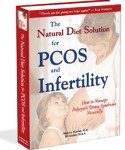Treating Gestational Diabetes
by Brooke Fotheringham
See other sections of this article here:
- Part 1: What Is Gestational Diabetes? Brooke explains what gestational diabetes is and how it is diagnosed.
- Part 3: What I Did. In this section, Brooke shares her incredible journey toward a solution.
I was bummed when I got the results back, but not surprised having been aware of the increased gestational diabetes risk for myself. The silver lining of that day was that I got to call my husband at work, do my best Willford Brimley impression and say, "Honey, I've got the dia-beeet-iss." Which oddly, I think will be one of my favorite moments of my entire life.
I was signed up for the required nutritional counseling, and scheduled an appointment with a nurse to learn how to use a glucose meter. The appointment date was set for a full month after taking the test, which seems like a long time to let women flounder if the implications for the baby and mama are as serious as I was led to believe from the handouts I was given by my midwives.
For anyone who is curious about what their blood sugar levels might be like, I didn't know until I went through the counseling, but anyone can get a glucose meter over the counter for about $20, and 10-20 cents for each strip and lancet. I think a glucose meter is a good tool to have around for anyone with PCOS to learn how different foods affect your blood sugar. Being aware of your blood sugar levels, and knowing how you responde to different foods now could stave off diabetes later in life too. Even though I no longer have diabetes, I still use it every week or two just to check in. As a general rule, you never want your blood sugar to be over 120 two hours after eating, and to be between the 70's and 90's fasting.
I had a pretty good idea of what my plan was for a diet considering I had put so much work into trying to treat my own insulin resistance and restore my fertility, with sort of a cross between the PCOS Diet and Paul and Shou-Ching Jaminet's Perfect Health Diet (a version of the paleo diet), however I was going to wait and see what the class had to teach me before embarking on anything set in stone.
My morning sickness (all day sickness really) had been so awful that all I had been able to eat when I could eat was essentially the opposite of what my diet normally looked like pre-pregnancy, and consisted of milk, fruit, bread, nuts, and cheese for the first 20 weeks. I was looking forward to getting back on track and figuring out how to get more veggies and meat into my belly with or without a GD diagnosis (although I was relieved to find out meat and green vegetable aversions during pregnancy have been found to be protective for the fetus to avoid exposure to excess protein and plant alkaloids that could interfere with fetal development, so I wasn't in too much of a hurry). Full disclosure, I did go out for doughnuts a few times while I was waiting for the glucose meter, honoring the long standing law of human nature that "ignorance is bliss". The one time we went out for doughnuts after I got the glucose meter, my fasting blood sugar level the next morning was enough to scare me at 117, way up from my normal mid 80's to low 90's. I don't know how high it had been the night before, but tissue damage starts at about 140. In retrospect I regret my laissez faire attitude about those indulgences regarding fried dough drizzled in crazy amounts of liquified sugar.
Since embarking on my road to actively trying to be healthy enough to get pregnant, and researching nutrition, I've been known to develop some opinions along the way about what actually qualifies as "healthy food". A quote from from Gary Taubes, "If you only eat what they tell you not to, you'll be fine." kept running through my head as I perused the prescribed diet handout that was chock full of processed products made with whole wheat, low fat dairy, and vegetable oils. Egads! We can really do better than this. Don't get me wrong, if someone has been living on fast food, drinking buckets of soda, or eating pancakes drowned in corn syrup based fake maple syrup at the local greasy spoon for breakfast everyday they will enjoy a marked improvement on their health with the prescribed diet. But as it is published, if the goal really is to regulate blood sugar while providing the fetus with the nutrition to thrive, there is a lot of room for improvement.
I quite liked the counselor, she was bright, sparkly, and enthusiastic, in spite of the difficulty and sense of futility that must come from telling pregnant women what to eat. Willpower is low, and food aversions high, so even coming up a basic standardized diet is on the verge of an exercise in futility. But it is my hope that I have come up with a few decent suggestions here to improve future versions of these types of diets.
I was given a notebook with the recommended diet and there was a lot of tongue biting during the section about "healthy whole grains" considering that drastically reducing grains in my diet was one of the most effective things I've done to improve my health. Granted, whole grain foods don't spike blood sugar the way more refined grain foods do, but if you can go without grains or at least reduce them to a few servings per week, you can have even better glycemic control. If you have been following the PCOS diet you've probably already dropped most grain-based foods. I don't think I could have gotten pregnant in the first place if I hadn't made the conscious effort to reduce my consumption of bread and cereal as much as possible.
On the prescribed diet, I was also encouraged to drink a glass of milk with most of my meals. I don't know about the rest of you, but milk spikes my blood sugar like there is no tomorrow. And when I was pregnant it didn't wear off after a few hours either, my fasting blood sugars were significantly higher the day after drinking milk. Ice cream and a handful of nuts was recommended as a bed time snack, and while being a very tasty treat, eating a lot of sugar and milk right before bed prevents your body from accessing its own fat stores during the night to help with the development of your baby's brain.
Little known fact: The fat in your thighs and butt is by design a source of essential fatty acids for your developing baby's brain. Letting your body dip into those stores while you sleep is in my opinion an essential part of growing a healthy baby. Women collect "junk in the trunk" for a reason. I followed orders and did try the ice cream at bed thing for a week (gee twist my arm), and while I did stop registering ketones on the ketostix in the morning, it didn't do anything good for my fasting blood sugar levels.
Being pretty darn certain the low to moderate ketones registering on the Ketostix had nothing to do with ketoacidosis (my recorded blood sugars never got even close to the 170-200 range needed to be in danger of developing ketoacidosis during pregnancy), so I dropped the nightly ice cream. Growing a little person does use an awful lot of energy though, and going to bed without eating something just wasn't going to happen some nights, so I would have a 4th meal usually a bit of aged cheese, kefir, or yogurt, a little meat, some nuts, dried apricots, and carrot sticks. My morning blood sugar levels were normal after those late night meals.
The layout of the diet was troublesome for me as well, since it was broken down into many small meals. For people prone to hypoglycemia, frequent small meals can help, but I've been under the impression for a long time that the best thing one can do to stabilize blood sugar levels, and regain insulin sensitivity is to reduce meal frequency (note: it is a u-shaped curve, things get wonky again if you starve yourself, go too low carb, or do a lot of fasting). Every time you eat, you get a blood sugar bump, and the following insulin release. As I understand it, the more often you pump out insulin the less sensitive your tissues tend to become to it over time leading to insulin resistance, and eventually diabetes. Why would I want to adopt a diet plan that encourages the development of diabetes to treat diabetes? Before I got pregnant sticking to 2-3 hearty meals, and no snacking did amazing things for improving my insulin sensitivity. It seems weird to me that eating a small grain and dairy based meal every three hours could possibly improve things.
As it turns out controlling blood sugar isn't even the strongest focus of the prescribed diet because there are always insulin shots to fall back on, but to prevent the formation of ketones (letting your body use its fat stores or dietary fat for energy) out of the erroneous fear that any exposure of the fetus to any ketones could cause brain damage (based on a study where they soaked fetal sheep brain cells in a saturated ketone solution and they didn't continue to grow...so many things wrong with basing a gestational diabetes diet on that on that single experiment). Both glucose and ketones in the right proportions are useful fuel sources for the growing fetus.
I feel for the designers of this diet because they have been given some odd and hard to square parameters, and they have actually figured out a way to meet those parameters. They have to to keep blood sugar in check, and simultaneously preventing the spilling of ketones worried that it could mean ketoacidosis, but that is based on a misunderstanding about how common and natural ketosis is. Burning body fat aka ketosis is how we make it from dinner to breakfast without needing to eat. If we didn't have that ability we would have to get up to eat every 3-4 hours. I like to think of switching from using glucose to fat in normal metabolism like the tides, ebbing and flowing back and forth. If this was a truly problematic state of affairs, humans would have had a very hard time surviving before the invention of 24 hour grocery stores and refrigerators.
Ketoacidosis is not something to be taken lightly, so it is important to understand the differences between ketosis and ketoacidosis really well. When blood sugar levels stay too high for too long, and the body starts to cannibalize itself in rapid and dangerous ways to try and maintain homeostasis. That is an emergency situation, and can lead to coma or death. For the most part ketoacidosis is associated with Type 1 diabetes, but pregnant mothers can develop it as well. It you have GD and have been ill, have prolonged high blood sugars, spill high levels of ketones, or just feel really unwell, it can be worth, checking your blood sugar, peeing on some Ketostix, and consulting with your midwife or OB for the sake of both you and your baby.
So ketoacidosis can harm babies, but dietary ketosis (as long as the mother eats enough to avoid malnourishment) does not. Dietary and functional ketosis is not the same thing as ketoacidosis, and anyone who doesn't know the difference probably shouldn't be counseling diabetics. However, most of the literature I was handed about managing gestational diabetes, no distinction was made between the two conditions, even though the difference in ketone bodies circulating in the blood during ketoacidosis is hundreds of times higher than in dietary ketosis.
Return to
Gestational Diabetes Is a Pregnancy Risk in PCOS
PCOS Health Review
This free newsletter gives you original and immediately usable information to help you deal with PCOS.
Get the latest research, tips for improving your health, answers to questions, success stories, and more!
Your e-mail address is totally secure. We will never misuse your information.
Enter Your Email Above to Subscribe Today
and Get Your Questions Answered in this Free Special Report!





